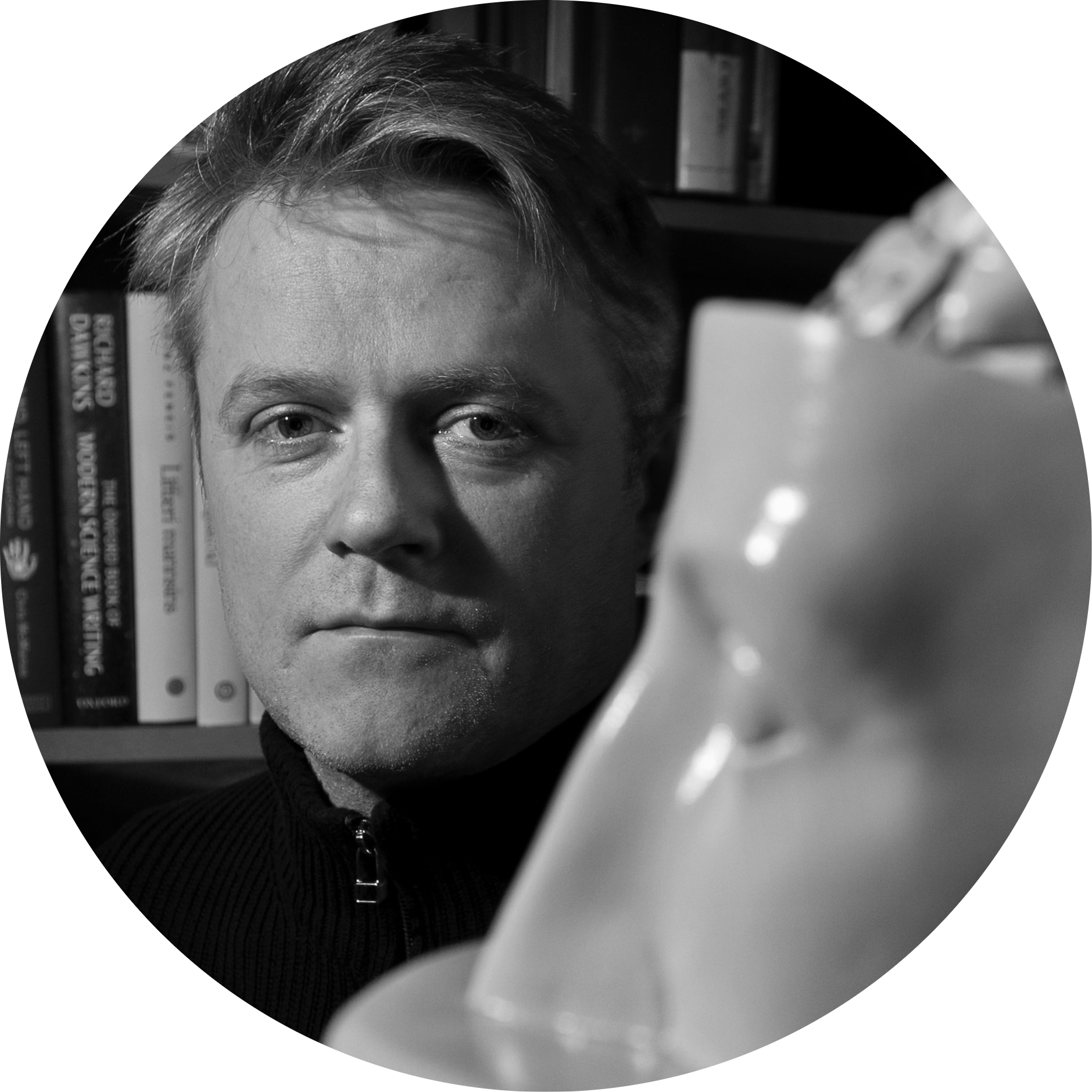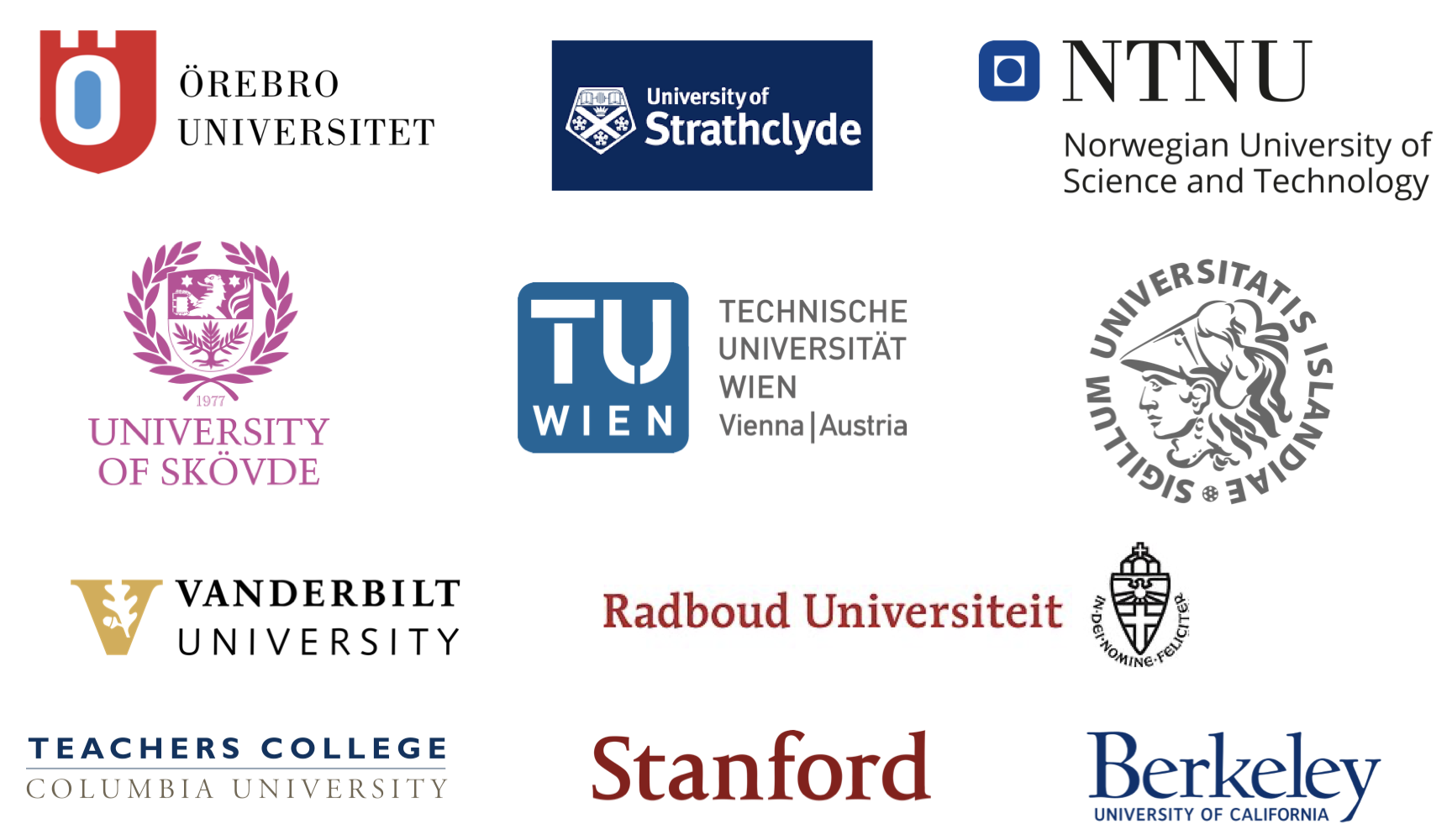INSTITUTE FACULTY
Austria (Vienna University of Technology) \ Germany (Constructor University Bremen. Airbus Hamburg) \ Italy (Free University of Bozen-Bolzano. University of Salerno. ICAR-CNR) \ Iceland (University of Iceland) \ Netherlands (Vrije Universiteit Amsterdam) \ Poland (Jagiellonian University - Kraków) \ Sweden (Örebro University. University of Skövde.) \ United Kingdom (Imperial College London) \ United States (Georgia Institute of Technology. UC Berkeley. University of Colorado at Boulder. Stanford University & Columbia University.)
Prof. Cindy Xiaong Bearfield
Georgia Institute of Technology, United States /
 I am an Assistant Professor in the School of Interactive Computing at Georgia Tech. I received my Ph.D. in Cognitive Psychology from Northwestern University and my undergraduate degrees in Applied Mathematics and Psychology from UCLA.
My research program combines visual perception, cognition, and data visualization. By investigating how humans perceive, interpret, and make decisions from visualized data, I answer questions such as "what are the underlying perceptual and cognitive processes when people make sense of data visualizations?", and "how can we design an effective visualization or tell a good story with data?".
I am an Assistant Professor in the School of Interactive Computing at Georgia Tech. I received my Ph.D. in Cognitive Psychology from Northwestern University and my undergraduate degrees in Applied Mathematics and Psychology from UCLA.
My research program combines visual perception, cognition, and data visualization. By investigating how humans perceive, interpret, and make decisions from visualized data, I answer questions such as "what are the underlying perceptual and cognitive processes when people make sense of data visualizations?", and "how can we design an effective visualization or tell a good story with data?".
Prof. Mehul Bhatt
Örebro University, SWEDEN /
 Mehul Bhatt is Professor within the School of Science and Technology at Orebro University (Sweden). His basic research focusses on formal, cognitive, and computational
foundations for AI technologies with a principal emphasis on knowledge representation, semantics, integration of commonsense reasoning & learning, explainability,
and spatial representation and reasoning. Visuospatial cognition and computation has been an area of intense activity from the viewpoint of interdisciplinary
research. His research in Spatial Cognition and AI particularly emphasises the study of human-behaviour (embodied multimodal interaction)
in naturalistic settings as a principal means of AI technology driven human-centred cognitive assistance in planning, decision-making, design situations
requiring an interplay of commonsense, creative, and specialist visuospatial thinking. Our lab has a track-record of in developing cognitive assistive
technologies and cognitive interaction systems —with a special emphasis on AI-Driven Cognitive Interaction and Design Technologies— in application
contexts where human-centred engineering and human-in-the-loop automation are critical, for instance: autonomous systems (i.e., high-level cognitive interpretation,
interaction and control); AI-driven architecture and built environment design; communications and media design technologies
(i.e., multimodal perception and synthesis, visuo-auditory media design)
/ (Research Statement > Artificial and Human Intelligence)
Mehul Bhatt is Professor within the School of Science and Technology at Orebro University (Sweden). His basic research focusses on formal, cognitive, and computational
foundations for AI technologies with a principal emphasis on knowledge representation, semantics, integration of commonsense reasoning & learning, explainability,
and spatial representation and reasoning. Visuospatial cognition and computation has been an area of intense activity from the viewpoint of interdisciplinary
research. His research in Spatial Cognition and AI particularly emphasises the study of human-behaviour (embodied multimodal interaction)
in naturalistic settings as a principal means of AI technology driven human-centred cognitive assistance in planning, decision-making, design situations
requiring an interplay of commonsense, creative, and specialist visuospatial thinking. Our lab has a track-record of in developing cognitive assistive
technologies and cognitive interaction systems —with a special emphasis on AI-Driven Cognitive Interaction and Design Technologies— in application
contexts where human-centred engineering and human-in-the-loop automation are critical, for instance: autonomous systems (i.e., high-level cognitive interpretation,
interaction and control); AI-driven architecture and built environment design; communications and media design technologies
(i.e., multimodal perception and synthesis, visuo-auditory media design)
/ (Research Statement > Artificial and Human Intelligence)
Mehul Bhatt steers CoDesign Lab (www.codesign-lab.org),
an initiative aimed at addressing the confluence of Cognition, Artificial Intelligence, Interaction, and Design Science for the development of human-centred cognitive
assistive technologies and interaction systems. Since 2014, he directs the research and consulting group
DesignSpace
and pursues ongoing research in
Cognitive Vision
and Spatial Reasoning.
Dr. Emmanuelle Dietz
Airbus Hamburg, Germany /
 Emmanuelle Dietz is a human-centered technology scientist at Airbus Central R&T in Hamburg, Germany. Previously, she was a postdoctoral researcher at the Knowledge Representation and Reasoninggroup at TU Dresden. After completing her master’s degree in Computer Science at Utrecht University,she registered in the European PhD Program in Computational Logic at TU Dresden where she receiveda joint PhD Degree. During and after her PhD studies she was a visiting researcher at UNL in Portugal,SFU in Canada and UCY in Cyprus. Her research interest covers areas from Cognitive Science, Computa-tional Argumentation and Logic Programming, in particular the formalization of human reasoning and benchmarking cognitive models.
Emmanuelle Dietz is a human-centered technology scientist at Airbus Central R&T in Hamburg, Germany. Previously, she was a postdoctoral researcher at the Knowledge Representation and Reasoninggroup at TU Dresden. After completing her master’s degree in Computer Science at Utrecht University,she registered in the European PhD Program in Computational Logic at TU Dresden where she receiveda joint PhD Degree. During and after her PhD studies she was a visiting researcher at UNL in Portugal,SFU in Canada and UCY in Cyprus. Her research interest covers areas from Cognitive Science, Computa-tional Argumentation and Logic Programming, in particular the formalization of human reasoning and benchmarking cognitive models.
Prof. Thomas Eiter
Vienna University of Technology, AUSTRIA /
 Thomas Eiter is a professor in the Faculty of Informatics of Vienna University of Technology (TU Wien), where is the head of the Knowledge-Based Systems Group and the Institute for Logic and Computation. He has been working in different fields of Computer Science and AI, with special interest in knowledge representation and reasoning, logic and computation, and declarative problem solving. Eiter is a fellow of the ACM, of the European Association for Artificial Intelligence (EurAI), and of the Asia-Pacific Artificial Intelligence Association (AAIA), as well as member of the Austrian Academy of Sciences and of Academia Europea (London). Furthermore, he is president of the Association for Logic Programming and past president of KR Inc., the organizatio behind the Conference on Principles of Knowledge Representation and Reasoning.
Thomas Eiter is a professor in the Faculty of Informatics of Vienna University of Technology (TU Wien), where is the head of the Knowledge-Based Systems Group and the Institute for Logic and Computation. He has been working in different fields of Computer Science and AI, with special interest in knowledge representation and reasoning, logic and computation, and declarative problem solving. Eiter is a fellow of the ACM, of the European Association for Artificial Intelligence (EurAI), and of the Asia-Pacific Artificial Intelligence Association (AAIA), as well as member of the Austrian Academy of Sciences and of Academia Europea (London). Furthermore, he is president of the Association for Logic Programming and past president of KR Inc., the organizatio behind the Conference on Principles of Knowledge Representation and Reasoning.
Dr. Paul Hemeren
University of Skövde, SWEDEN /
 I am an associate professor in informatics at the University of Skövde and was recruited as a cognitive scientist to the University of Skövde where the subject area of informatics includes cognitive science for the development of computational models of intelligence and to improve the interaction between humans and different kinds of technology. My Ph.D. in Cognitive Science is from Lund University.
In my research, I look at how we form concepts for things. More specifically, I examine how we perceive other people's movements in the form of different actions. Humans and other creatures have an amazing ability to quickly perceive what others are doing. How does this happen? What information is used to perceive another person's intentions in an action or movement?
One side of my research is about how we organize our knowledge of other people's and our own actions. The other side of my research is about how movement information in connection with the actions of others is processed in the human brain. An important aim of my research is to integrate these two sides to gain a broader and deeper understanding of how we perceive our interaction with others. These questions turn out to be important inputs for more applied projects about how we can create safer situations for cyclists and how we can achieve a better interaction between humans and robots.
I am an associate professor in informatics at the University of Skövde and was recruited as a cognitive scientist to the University of Skövde where the subject area of informatics includes cognitive science for the development of computational models of intelligence and to improve the interaction between humans and different kinds of technology. My Ph.D. in Cognitive Science is from Lund University.
In my research, I look at how we form concepts for things. More specifically, I examine how we perceive other people's movements in the form of different actions. Humans and other creatures have an amazing ability to quickly perceive what others are doing. How does this happen? What information is used to perceive another person's intentions in an action or movement?
One side of my research is about how we organize our knowledge of other people's and our own actions. The other side of my research is about how movement information in connection with the actions of others is processed in the human brain. An important aim of my research is to integrate these two sides to gain a broader and deeper understanding of how we perceive our interaction with others. These questions turn out to be important inputs for more applied projects about how we can create safer situations for cyclists and how we can achieve a better interaction between humans and robots.
Prof. Árni Kristjánsson
University of Iceland, ICELAND /
 My research focuses on various aspects of human visual perception, such as visual attention and eye movements, how representations of the visual world are formed, visual foraging, and the influence of perceptual history on perception in the present. I mainly use psychophysical methods to answer these questions, but members of my lab and I are also involved in eye-tracking studies, neuroimaging, neuropsychological work, cognitive development studies, and clinical psychology.
I received my Ph.D. from Harvard University in 2002, and worked as Honorary Research Fellow at the Institute of Cognitive Neuroscience at UCL from 2002-2004. From 2004 I have had a position at the University of Iceland.
My research focuses on various aspects of human visual perception, such as visual attention and eye movements, how representations of the visual world are formed, visual foraging, and the influence of perceptual history on perception in the present. I mainly use psychophysical methods to answer these questions, but members of my lab and I are also involved in eye-tracking studies, neuroimaging, neuropsychological work, cognitive development studies, and clinical psychology.
I received my Ph.D. from Harvard University in 2002, and worked as Honorary Research Fellow at the Institute of Cognitive Neuroscience at UCL from 2002-2004. From 2004 I have had a position at the University of Iceland.
Dr. Vasiliki Kondyli
Jagiellonian University - Kraków, POLAND /
 Vasiliki Kondyli is an interdisciplinary researcher between Design, Cognitive Science, and Computer Science. Vasiliki obtained her PhD in Computer Science at Örebro University (Sweden) as part of the Marie Marie Skłodowska-Curie Grant, and she is currently a postdoctoral researcher at the Center for Cognitive Science, Jagiellonian University (Poland). Vasiliki is a trained architect (University of Patras, Greece) with specific expertise in parametric systems and environmental psychology and a member of the DesignSpace Group (www.design-space.org) and the CoDesign Lab EU (https://codesign-lab.org/). Her research interests involve embodied multimodal interactions between humans and their surrounding environment, specifically aspects of visual perception and spatial cognition studied under naturalistic conditions. A special focus has been on the development of a cognitive technological framework for human-centred assistive technologies and autonomous systems such as autonomous driving and design assistive technologies.
Vasiliki Kondyli is an interdisciplinary researcher between Design, Cognitive Science, and Computer Science. Vasiliki obtained her PhD in Computer Science at Örebro University (Sweden) as part of the Marie Marie Skłodowska-Curie Grant, and she is currently a postdoctoral researcher at the Center for Cognitive Science, Jagiellonian University (Poland). Vasiliki is a trained architect (University of Patras, Greece) with specific expertise in parametric systems and environmental psychology and a member of the DesignSpace Group (www.design-space.org) and the CoDesign Lab EU (https://codesign-lab.org/). Her research interests involve embodied multimodal interactions between humans and their surrounding environment, specifically aspects of visual perception and spatial cognition studied under naturalistic conditions. A special focus has been on the development of a cognitive technological framework for human-centred assistive technologies and autonomous systems such as autonomous driving and design assistive technologies.
Prof. Clayton Lewis
University of Colorado - Boulder, UNITED STATES /
 Clayton Lewis is Emeritus Professor of Computer Science at the University of Colorado Boulder. Lewis served previously as Co-Director for Technology for the Coleman Institute for Cognitive Disabilities, and Fellow of the Institute of Cognitive Science, at CU, and as technology advisor to the director of the National Institute for Disability and Rehabilitation Research, US Department of Education. Lewis' recent research explores the implications of the success of predictive models, such as Large Language Models, for theories of human cognition. Other recent work addresses the implications of the same technology for programming, including especially programming in educational settings. He has also investigated the potential of machine learning to contribute to the develoment of supports for people with cognitive disabilities, including artificial personal assistants.
Clayton Lewis is Emeritus Professor of Computer Science at the University of Colorado Boulder. Lewis served previously as Co-Director for Technology for the Coleman Institute for Cognitive Disabilities, and Fellow of the Institute of Cognitive Science, at CU, and as technology advisor to the director of the National Institute for Disability and Rehabilitation Research, US Department of Education. Lewis' recent research explores the implications of the success of predictive models, such as Large Language Models, for theories of human cognition. Other recent work addresses the implications of the same technology for programming, including especially programming in educational settings. He has also investigated the potential of machine learning to contribute to the develoment of supports for people with cognitive disabilities, including artificial personal assistants.
Before joining the University of Colorado, Lewis was Manager of Human Factors at IBM’s Watson Research Center, where he was a member of the research staff from 1970 to 1973 and 1979 to 1984. He holds degrees from Princeton, MIT, and the University of Michigan. He has been honored by appointment to the ACM SIGCHI Academy, by the SIGCHI Social Impact Award, by the Strache Leadership Award (CSUN Assistive Technology Conference), and by the ACM SIGACCESS Outstanding Contribution Award.
Prof. Oliver Kutz
Free University of Bozen-Bolzano, ITALY /
 My research focus lies at the intersections of computational and philosophical logic, knowledge representation, cognitive artificial intelligence, computational creativity, and applied ontology. More specifically, I work in the areas of Modal and Description Logics, ontologies and the logical foundations of the Semantic Web, non-monotonic reasoning and abduction, spatial reasoning, combination techniques for logics, models for conceptual blending, and the formalisation of core concepts in cognition such as ‘affordances’ and ‘image schemas’. I investigate how formal models of logical reasoning and concept formation reflect common sense concepts of everyday reasoning, how such formal approaches can be informed through computational cognitive models, and how combined hybrid approaches bridging machine learning and symbolic AI can lead to new approaches in explainable AI, computational creativity, and human-machine interaction.
I received a PhD from the University of Liverpool in 2005, held research positions in Manchester, Bremen, and Magdeburg, and am now Associate Professor at the Free University of Bozen-Bolzano, Italy, where I was recently the chief organiser and scientific chair of the 2020/21 Bolzano Summer of Knowledge. In 2023, I was elected President of the International Association for Ontology and its Applications (IAOA.org).
My research focus lies at the intersections of computational and philosophical logic, knowledge representation, cognitive artificial intelligence, computational creativity, and applied ontology. More specifically, I work in the areas of Modal and Description Logics, ontologies and the logical foundations of the Semantic Web, non-monotonic reasoning and abduction, spatial reasoning, combination techniques for logics, models for conceptual blending, and the formalisation of core concepts in cognition such as ‘affordances’ and ‘image schemas’. I investigate how formal models of logical reasoning and concept formation reflect common sense concepts of everyday reasoning, how such formal approaches can be informed through computational cognitive models, and how combined hybrid approaches bridging machine learning and symbolic AI can lead to new approaches in explainable AI, computational creativity, and human-machine interaction.
I received a PhD from the University of Liverpool in 2005, held research positions in Manchester, Bremen, and Magdeburg, and am now Associate Professor at the Free University of Bozen-Bolzano, Italy, where I was recently the chief organiser and scientific chair of the 2020/21 Bolzano Summer of Knowledge. In 2023, I was elected President of the International Association for Ontology and its Applications (IAOA.org).
Prof. Antonio Lieto
University of Salerno and ICAR-CNR, ITALY /
 Antonio Lieto is an Associate Professor in Computer Science at the University of Salerno (Italy) and a research associate at the ICAR-CNR Institute in Palermo (Italy). He does research in Artificial Intelligence, Computational Cognitive Science and Human-Machine Interaction (and their intersections) with a focus on the following areas: knowledge representation and reasoning, semantic/language technologies, cognitive architectures for intelligent agents (embodied or not), persuasive technologies. Since January 2024, he is an elected member of the Scientific Board of the Italian Association for Artificial Intelligence (AI*IA).
Previously, he has been Vice-President of the Italian Association of Cognitive Sciences (AISC, 2017-2022), the recipient of the “Outstanding BICA Research Award” from the Biologically Inspired Cognitive Architecture Society (USA) and, since 2020, is an ACM Distinguished Speaker. He has authored the book “Cognitive Design for Artificial Minds” (Routledge/Taylor & Francis, 2021) and over 100 scientific publications.
Antonio Lieto is an Associate Professor in Computer Science at the University of Salerno (Italy) and a research associate at the ICAR-CNR Institute in Palermo (Italy). He does research in Artificial Intelligence, Computational Cognitive Science and Human-Machine Interaction (and their intersections) with a focus on the following areas: knowledge representation and reasoning, semantic/language technologies, cognitive architectures for intelligent agents (embodied or not), persuasive technologies. Since January 2024, he is an elected member of the Scientific Board of the Italian Association for Artificial Intelligence (AI*IA).
Previously, he has been Vice-President of the Italian Association of Cognitive Sciences (AISC, 2017-2022), the recipient of the “Outstanding BICA Research Award” from the Biologically Inspired Cognitive Architecture Society (USA) and, since 2020, is an ACM Distinguished Speaker. He has authored the book “Cognitive Design for Artificial Minds” (Routledge/Taylor & Francis, 2021) and over 100 scientific publications.
Prof. Alessandra Russo
Imperial College London,
UNITED KINGDOM /
 Alessandra Russo is a Professor on Applied Computational Logic, at the Department of Computing, Imperial College London, Deputy director of the UKRI Centre for Doctoral Training in “Safe and Trusted AI”, and promoter of the Imperial-X inter-disciplinary research initiative “Intelligible AI” on explainable, safe and trustworthy AI. She leads the “Structured and Probabilistic Intelligent Knowledge Engineering (SPIKE)” research group at the Department of Computing. She has pioneered several state-of-the-art symbolic machine learning systems, including the recent state-of-the-art LAS (Learning from Answer Sets) system for learning interpretable knowledge from labelled data. More recently she has explored novel methodologies for neuro-symbolic learning that integrate machine learning and probabilistic inference with symbolic learning to support generalisation and transfer learning from multimodal unstructured data. She has published over 200 articles in flagship conferences and high impact journals in Artificial Intelligence and Software Engineering, and led various projects funded by the EPSRC, the EU and Industry.
Alessandra Russo is a Professor on Applied Computational Logic, at the Department of Computing, Imperial College London, Deputy director of the UKRI Centre for Doctoral Training in “Safe and Trusted AI”, and promoter of the Imperial-X inter-disciplinary research initiative “Intelligible AI” on explainable, safe and trustworthy AI. She leads the “Structured and Probabilistic Intelligent Knowledge Engineering (SPIKE)” research group at the Department of Computing. She has pioneered several state-of-the-art symbolic machine learning systems, including the recent state-of-the-art LAS (Learning from Answer Sets) system for learning interpretable knowledge from labelled data. More recently she has explored novel methodologies for neuro-symbolic learning that integrate machine learning and probabilistic inference with symbolic learning to support generalisation and transfer learning from multimodal unstructured data. She has published over 200 articles in flagship conferences and high impact journals in Artificial Intelligence and Software Engineering, and led various projects funded by the EPSRC, the EU and Industry.
Prof. Jakob Suchan
Constructor University, GERMANY /
 Jakob Suchan is Assistant Professor at the Constructor University, Germany. My research is in the area of Cognitive Vision, particularly focussing on the integration of Vision and AI (specifically, KR) from the viewpoint of computational cognitive systems where integrated (embodied) perception and interaction are involved. My publications lie at the intersection of AI, Computer Vision, and Human-Centred Computing. In particular, I am interested in how we can develop general methods and tools that enable autonomous systems to abstract, understand, reason about, and learn from multimodal (human) Interactions, with the aim to assist humans in their everyday personal and professional tasks. From a technical point of view this includes for instance: -- Commonsense Abstractions of Space and Motion -- Declarative Reasoning and Learning about Visuospatial Dynamics -Neurosymbolic Integration of AI and Vision- Visual Perception (e.g., involving eye-tracking)
Jakob Suchan is Assistant Professor at the Constructor University, Germany. My research is in the area of Cognitive Vision, particularly focussing on the integration of Vision and AI (specifically, KR) from the viewpoint of computational cognitive systems where integrated (embodied) perception and interaction are involved. My publications lie at the intersection of AI, Computer Vision, and Human-Centred Computing. In particular, I am interested in how we can develop general methods and tools that enable autonomous systems to abstract, understand, reason about, and learn from multimodal (human) Interactions, with the aim to assist humans in their everyday personal and professional tasks. From a technical point of view this includes for instance: -- Commonsense Abstractions of Space and Motion -- Declarative Reasoning and Learning about Visuospatial Dynamics -Neurosymbolic Integration of AI and Vision- Visual Perception (e.g., involving eye-tracking)
Prof. Ilaria Tiddi
Vrije Universiteit Amsterdam, NETHERLANDS /
 Ilaria Tiddi is an Assistant Professor in Hybrid Intelligence at the Knowledge in AI (KAI) group of the Vrije Universiteit Amsterdam (NL). Her research focuses on creating systems that generate complex narratives through a combination of semantic technologies, open data and machine learning, applied mostly in scientific and robotics scenarios. She is Editor-in-Chief of the CEUR-WS publication, part of the Steering Committee for the Hybrid Human-AI Conference, and Coordinator of the international Staff Exchange for the Dutch Hybrid Intelligence consortium. Since 2014, she is regularly active in the OCs/PCs of the major venues in the KR field (ISWC/ESWC, HHAI, WWW, CIKM, IJCAI/ECAI).
Ilaria Tiddi is an Assistant Professor in Hybrid Intelligence at the Knowledge in AI (KAI) group of the Vrije Universiteit Amsterdam (NL). Her research focuses on creating systems that generate complex narratives through a combination of semantic technologies, open data and machine learning, applied mostly in scientific and robotics scenarios. She is Editor-in-Chief of the CEUR-WS publication, part of the Steering Committee for the Hybrid Human-AI Conference, and Coordinator of the international Staff Exchange for the Dutch Hybrid Intelligence consortium. Since 2014, she is regularly active in the OCs/PCs of the major venues in the KR field (ISWC/ESWC, HHAI, WWW, CIKM, IJCAI/ECAI).
Prof. Barbara Tversky
Stanford University, and Columbia University, UNITED STATES /
 Barbara Tversky is a cognitive psychologist who has worked on memory, categorization, spatial language and thinking, event perception and cognition, cognitive tools, diagrammatic reasoning, gesture, joint action, design, and creativity. Her degrees were from the University of Michigan. She is Professor Emerita of psychology at Stanford University and Columbia Teachers College. She has served on the organizing committees of many interdisciplinary and international meets, on the governing boards of many organizations, and on the editiorial boards of many journals. She was President of the Association for Psychological Science, is a Fellow of the Association for Psychological Science, the Cognitive Science Society, the Society for Experimental Psychology, and the Psychonomic Society. She was elected to the American Academy of Arts and Sciences and received the Kampe de Feriat Award.
Barbara Tversky is a cognitive psychologist who has worked on memory, categorization, spatial language and thinking, event perception and cognition, cognitive tools, diagrammatic reasoning, gesture, joint action, design, and creativity. Her degrees were from the University of Michigan. She is Professor Emerita of psychology at Stanford University and Columbia Teachers College. She has served on the organizing committees of many interdisciplinary and international meets, on the governing boards of many organizations, and on the editiorial boards of many journals. She was President of the Association for Psychological Science, is a Fellow of the Association for Psychological Science, the Cognitive Science Society, the Society for Experimental Psychology, and the Psychonomic Society. She was elected to the American Academy of Arts and Sciences and received the Kampe de Feriat Award.
